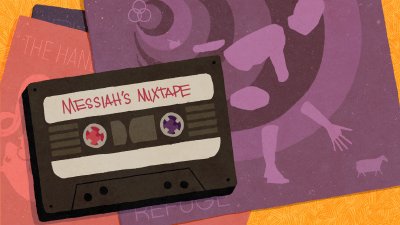Enthroned on the Praises
Have you had the experience yet of running into someone you haven't talked to since before COVID? It was great to catch up with my friend Greg recently, as we hadn’t talked much since he launched a new church plant in that "BC" era. When he shared all that has transpired since then, I was blown away. He’s still planting the church, but that’s about the only thing that didn’t change! No matter how much time I spend with church planters and other pioneers, it never ceases to amaze me how wrong we always are about how the future will unfold. That’s not only true in the birth and life of a church: how much of your own life has come to pass exactly as you predicted?
As the military strategist Helmuth von Moltke famously declared, “No battle plan survives first contact with the enemy.” It seems making a detailed plan is a really great way to get down on paper exactly what won’t happen. So why do we even bother? I think the reason we do it (and should!) is because making a detailed plan helps us imagine our ideals, our vision and values, in concrete form. It allows us to talk about the dreams we share together. Looking back on the year’s expenses can be an exercise in accountability and discipline, but it’s also often a litany of things we never saw coming. Writing it all down helps us better to see who we desire to be, and who we’re not, despite all our intentions and efforts. But I hope more than anything it’s an opportunity we use to celebrate, not how faithful we were, but how faithful God is.
As we prepare to review our church budget this Sunday, I want to encourage us to remember that our greatest responsibility is in asking ourselves questions like, “Is this plan a faithful picture of who we want to be?” and, “Can we offer this budget as a prayer of supplication, asking the Lord to bless our earnest desires to glorify him in all the ministry these digits represent?” The budget is not an interruption in worship to handle the church’s administrative necessities. It is most purely an act of worship. And as we will see in this Sunday's text, worship is first and foremost the overflow of praise in gratitude. So, let’s make sure we remember that the table where we balance our checkbook is the same one where we’ve received the body and blood of Christ our Savior. Thanks be to God for that!
- joshua

Enthroned on the Praises
June 12, 2022 • Rev. Joshua Smith • Psalm 22:21–30
A Progression of Pilgrims
July 31, 2022 • Rev. Joshua Smith • Psalm 68:24–35
“Faith is not the clinging to a shrine but an endless pilgrimage of the heart.” ― Abraham Joshua Heschel “This hill, though high, I covet to ascend; The difficulty will not me offend. For I perceive the way to life lies here. Come, pluck up, heart; let's neither faint nor fear. Better, though difficult, the right way to go, Than wrong, though easy, where the end is woe.” ― John Bunyan, The Pilgrim's Progress I have found out that there ain’t no surer way to find out whether you like people or hate them than to travel with them.” — Mark Twain, Tom Sawyer Abroad ---------------------------------------------------- Well, we’ve come to the end of our Messiah’s Mixtape Series. While I love starting a new thing, I’m learning not to rush on to the next event without reflecting carefully on what’s passed. Mostly Allie has taught me this discipline, which has an element of healthy grieving to it. Maybe that’s why we don’t stop to process our experiences often enough: because it feels too much like a death. But I can’t begin to tell you what a blessing it is to grieve as those who have hope. It’s a kind of gratitude to look back and remember all the providence of God, and I have so loved this provision. We began our summer in the Psalms by looking at Mary’s Magnificat, wondering at the womb that nourished our Messiah with the songs of Israel. Then, we dug into those Psalms and considered Jesus from so many angles: One who is not only God, but is also truly human. Alongside us He desires, and mourns, and suffers, and longs, and hopes. And He does so within and on behalf of a people, a family, made out of love. I’m honestly so glad we had Will to preach three of those Psalms. His keen perspective and pastoral kindness are a daily gift to me personally and I love that we got to share that part of him with you, too. If you missed any of those, they’re all archived on our website on the “our worship” page, under the “about us” tab. For the past few weeks, we’ve been wrapping up and hinting ahead to the next series by looking at the Messianic Psalm of Ascension. This final week in Psalm 68 zooms out on the covenant community and sees them joyfully ascending Zion behind their conquering Messiah. What we don’t see (and what the first readers of this Psalm would have known) is the backstory to this part of the Psalm. It’s 2 Samuel chapter 6, where King David undertakes to establish the permanent Temple. All the fanfare and celebration are still there, but we also get two tragic incidents that so haunt the memory of Israel as to sometimes hinder her upward progress. They’re a window into the kinds of things that can hinder our procession of pilgrims, too. I hope you'll join us and be encouraged by the fact that the same grace that brought us safe thus far shall also lead us home. - joshua
The Way Up Is Down
July 24, 2022 • Rev. Joshua Smith • Psalm 68:11–23
The Way Up Is Down I got a text today from a friend who’s sitting on a beach finishing reading The Lord of the Rings for the first time (oh, to be in his sandals!). He said it had been well over a decade since he’d watched The Return of the King and he had totally forgotten one of its biggest twists. The Witch-King of Angmar, Lord of the Nazgûl, who could “never be hindered by a man” was very much hindered by… a young woman, and a hobbit (half a man, some would say). As surprising and rewarding as that little verbal loophole is to the new (or forgetful) reader, imagine the shock to readers in the decades before women were commonly seen in battle at all! Yet by far the most surprised of creatures was that vile Ringwraith. He never saw it coming, and wouldn’t have believed it if you told him. Those who operate according to the ways and powers of this world cannot conceive of the economy of God. How can it be that the weak could so shame the strong? He was like the Mount of Bashan in Psalm 68 (our text again this week), looking down on “halflings,” like Pippen, or a little hill like Zion, with utter contempt. I was so pleased to discover that the background to this Psalm is formed in part by the story from Judges of Deborah and Barak, and Jael, the brave young woman who brought down the commander Sisera with a tent peg through his temple. What an exhilarating tale of the lowly defeating the exalted! A church member invoked the saying this week as she unexpectedly found herself in a hospital waiting room: “Where dependence is the goal, weakness is an advantage.” I repeat it ad nauseam to you guys because I have found it to be one of the kinder truths I have ever encountered. Don’t get me wrong: I resist feeling or being seen as weak with every fiber of my broken little heart. But that is also exactly where I have most felt the abiding presence of God, for Whom I am made. And He’s been so faithful to show me that the way up is down. So, I hope you can join us this weekend as we continue on to part two of three in plumbing the depths of our final Messianic Psalm this summer. - joshua
God Shall Arise
July 17, 2022 • Rev. Joshua Smith • Psalm 68:1–10
God Shall Arise Sometimes you just happen onto the right thing. For example, today I ordered a muffin because it looked good in the display case. But it ended up being pumpkin chocolate chip, the smell of which transported me to my childhood in a way that was exactly what I needed in that moment. It reminds me of how I didn’t fall in love with my wife as a result of some rigorous evaluation process designed to match me with the perfect companion and partner. I met a bewilderingly beautiful girl and asked her on a date and she just turned out to be all of those things (and more!). God often uses our non-reflective desires to put us right where he wants us. That is, in fact, how I came to spend a good bit of my study leave this week reading Plato’s Republic with the Dean of the honors program at one of my alma maters. There are many good reasons one would do such a thing, but the first of them is simply that I am a nerd and it sounded fun to me. But as it turns out, since I am preparing to launch us into the Book of Acts this fall, it’s also been a perfect complement to my other studies. After all, the cultural background for the vast majority of New Testament characters and letter recipients was profoundly shaped by the philosophers Socrates, Plato, and Aristotle. Now, I didn’t have the foresight to plan these things to line up so well, but that didn’t stop God from being awesome to me. It’s true that Paul told some of these Corinthian Greeks that to their own people the cross is folly – actually the opposite of man’s wisdom. But he also spent precious time in Athens, the birthplace of these philosophies, using their own arguments to defend the very gospel that would eclipse them. He showed us that understanding a world is an important element in bringing them good news. Likewise, our own internal wrestlings to receive the gospel are helped along when we can identify what exactly it is in us that objects to His love. As Paul Harvey taught us, it’s often the rest of the story that makes sense of the more striking events. No matter how our background sets up our objections to the gospel, for God to have lived on earth and died on a cross only sounds like folly or a scandal if it is not then followed by the truth of His unassailable victory on our behalf. So, for the next three weeks, we’re going to work our way through one last epic song in Messiah’s Mixtape: Psalm 68. Here we will be given a glorious extended picture of the victory of God that follows from the cross of Christ by his resurrection, ascension, and a procession of gifts. - josh





